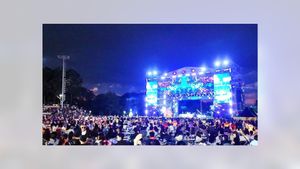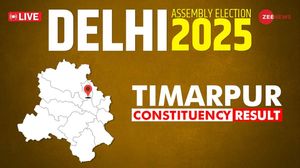The 2025 Mundka Assembly Election results have painted a vivid picture of electoral politics in Delhi, with the Bharatiya Janata Party (BJP) taking the lead over the Aam Aadmi Party (AAP) as votes were counted on February 8, 2025, following elections held on February 5.
Gajender Drall, the BJP candidate for the Mundka constituency, is leading with 25,549 votes, surpassing AAP's Jasbir Karala, who has garnered 21,415 votes. This transition signifies possible political upheaval as AAP has held power for the past decade. Reports indicate Drall is leading by 4,134 votes, as noted by India Today.
The Mundka seat has been closely watched, especially considering AAP's previous dominance where their candidate, Dharampal Lakra, won the last election against BJP's Azad Singh by a margin of 19,158 votes. The results of this election will set the tone for governance over the next five years, marking significant stakes for both major parties involved.
Turnout rates play a pivotal role in any election, and the 2025 assembly elections saw participation drop to approximately 60.3%, down from the previously recorded 61.46% during the 2020 elections. This slight decrease may raise questions about voter enthusiasm and engagement, especially as both the BJP and AAP gear up for potential legislative debates over the months to follow.
The significance of the election results extends beyond Mundka itself; they act as indicators of shifting sentiments across the capital. Amidst predictions of possible close seats, the BJP is hopeful of making substantial gains overall, possibly sweeping as many as 39-47 seats, as per exit polls. AAP, on the other hand, appears set to capture only about 23-31 seats.
Political analysts suggest the groundwork laid through the Union Budget and community-focused initiatives could be decisive for BJP's standing. Experts anticipate both the welfare programs rolled out by AAP and the return of Congress as the primary opposition party may factor significantly going forward.
Counting for all 70 seats commenced at 8 am on February 8, 2025, with early trends indicating Drall's favorable position as he consistently pulled ahead of his rivals throughout the counting process. This momentum developed quickly; within merely two hours, Drall had overtaken Karala and began extending his lead.
Initial reports reveal Drall’s performance has surpassed early estimates, which had also cast doubt on certain territories held by AAP, indicating possible vulnerabilities within the party's traditional strongholds.
Delhi's assembly elections have historically been competitive, with periodic surges from various parties reflecting changing public opinion and grievances. The 2025 election results, showing Drall's lead, may suggest the populace is responding to BJP's heightened criticisms of AAP's governance, emphasizing alleged failures and corruption associated with Arvind Kejriwal's administration. The now-rejected Delhi excise policy remained one principal point of contention.
Congress, having previously enjoyed success and power in the region, is attempting to reposition itself. During this election, they contested independently rather than as AAP’s former ally, indicating potential shifts not only within the assembly but also within the party dynamics themselves. They are predicted to face challenges with forecasts indicating they might capture less than two seats.
Voter demographics reflect substantial changes as well. Mundka’s registered voters for this election stood at 309,836, with the gender ratio skewed slightly, favoring male voters with 163,998 compared to 145,832 females. This constituency's profile reflects broader gender engagement trends across Delhi and bodes well for future elections to incorporate diverse candidates representing their respective communities.
Looking back, election data from previous years reminds us of the competitive nature of Delhi’s assembly races. For example, AAP’s majority victory came unexpectedly compared to earlier BJP wins and reflected the changes consumers and voters have come to expect from their representatives.
Do these results herald the dawn of a new political era for Mundka? The rising popularity of BJP and their candidate, Gajender Drall, could reshape the battle lines and redefine party strategies. Similarly, AAP must evaluate its approach to rally their base after losing ground.
The elections this year will undoubtedly influence future campaigns, voter perceptions, and party alignments as political narratives evolve and candidates seek to address changing voter demands directly.
Both Drall's win and Karala's performance will be examined thoroughly as political commentators analyze what these outcomes mean for the broader party landscapes across Delhi and beyond.
The results will settle who leads local governance for the coming term and will define the political heartbeat of Mundka through future interactions with the electorate over pivotal issues and community matters.
Overall, as this election closes and results are finalized, the electoral atmosphere remains charged with anticipations about new directions and responses as all parties regroup, reassess, and prepare for what lies next.



